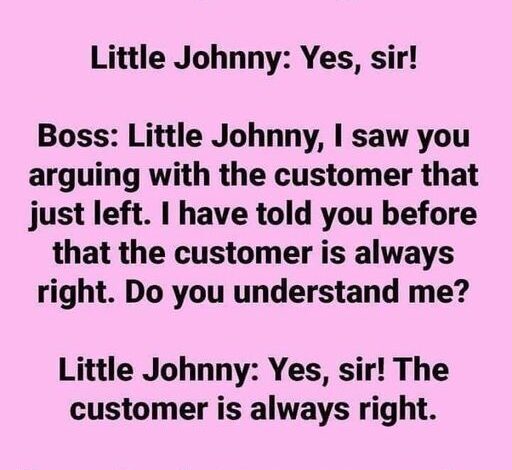
Customer Is Always Right!
Workplaces are often a juggling act of rules, customer service, and personalities. Some lessons in business are repeated so often that they become clichés, and perhaps none is repeated more than: “The customer is always right.” But sometimes, those words take on a meaning no one quite expects.
Little Johnny worked as a junior employee in a busy company. He was new, eager to prove himself, but he also had a sharp tongue and a quick wit that often landed him in situations his boss had to smooth over. One particular afternoon, Johnny found himself summoned to the boss’s office after what looked like a heated exchange with a departing customer.
The boss’s voice boomed across the office: “Johnny! Get in here immediately!”
Startled but not entirely surprised, Johnny hurried inside. “Yes, sir?” he answered, trying to keep his tone professional.
The boss, still bristling, leaned forward across his desk. “Johnny, I noticed you arguing with that customer who just left. I’ve told you before, and I’ll tell you again—the customer is always right. Do you understand that?”
Johnny nodded quickly. “Yes, sir. The customer is always right.”
The boss narrowed his eyes. “Good. So tell me then—what were you arguing about?”
Johnny hesitated for a moment, then answered truthfully. “The customer said my boss is stupid and an idiot, sir.”
The boss’s face darkened with indignation. “That foolish man! How dare he! And what exactly did you say back to him?”
Johnny replied calmly, “I told him he’s right.”
For a split second, silence filled the office. Then the boss’s face turned a shade of red somewhere between anger and disbelief. The irony of Johnny’s response was crystal clear.
This short exchange quickly spread among the staff, retold with chuckles in the breakroom and whispered down hallways. Johnny hadn’t broken the rule. In fact, he had followed it to the letter. If the customer was always right, then even an insult directed at the boss had to be accepted as correct. Johnny’s reply, while innocent in tone, had perfectly highlighted the absurdity of the saying.
The phrase “the customer is always right” has been drilled into service industries for decades. It’s meant to remind employees to be patient, accommodating, and willing to go the extra mile to ensure satisfaction. After all, a happy customer means repeat business, and repeat business keeps the lights on.
But anyone who has ever worked in customer service knows the truth: customers are not always right. Sometimes they are rude, misinformed, unreasonable, or even dishonest. And when management insists that their word is law, employees are left vulnerable, unable to defend themselves or their dignity.
Johnny’s story is funny because it turns the cliché upside down. He wasn’t disrespectful to the customer. He didn’t shout or argue back. He simply agreed in the most literal way possible, showing that rules without nuance can backfire.
The boss, of course, had a choice. He could laugh and appreciate Johnny’s wit, or he could take offense and reprimand him harshly. Most bosses probably would have done the latter, but one could argue that Johnny had just given his manager a valuable reminder: leadership isn’t just about repeating slogans. It’s about context, fairness, and knowing when to bend the rules.
In many workplaces, there’s an unspoken tension between management’s expectations and employees’ realities. Bosses want smooth operations, happy customers, and clean reputations. Employees, meanwhile, are the ones on the frontlines, navigating the daily grind of complaints, demands, and occasional hostility. When bosses repeat “the customer is always right” without considering their staff’s well-being, they risk undermining morale and loyalty.
What Johnny did, though cheeky, underscores something deeper: employees also deserve respect. Their perspective matters. A company that treats staff as disposable tools in the name of customer satisfaction risks losing not only workers but also its soul. After all, a business is nothing without the people who run it.
Ironically, in this story, Johnny both obeyed and disobeyed at the same time. He obeyed the rule—agreeing that the customer was right. But by doing so, he also subtly challenged his boss, pointing out how blindly following such a phrase can lead to humiliation rather than professionalism.
It’s a reminder for everyone—whether you’re a boss, a worker, or even a customer—that words have weight, and rules need wisdom. Customers deserve fair treatment, but so do employees. Respect should go both ways.
And as for Johnny? Well, he may have gotten a stern talking-to, but among his colleagues, he became something of a legend. His quick wit turned an ordinary workplace scolding into a story people would remember—and laugh about—for years.
So, is the customer always right? Perhaps not. Sometimes, as Johnny cleverly pointed out, they’re only right when it’s convenient. The real lesson is balance: knowing when to listen, when to lead, and when to laugh at ourselves.
Because at the end of the day, a little humor can save even the most uncomfortable situations—especially when the joke lands squarely on the boss.




